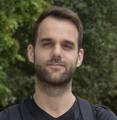
A Tufnell Park man is teaching the world what it is like living with dyslexia, one word at a time.

Sam Barclay, 33, has lived with the learning difficulty since he was eight. At school, he was called "lazy bones" by teachers who told him he would amount to nothing.
But after a stint in plumbing, Sam enrolled into a graphics design course at the University of Portsmouth. And several years later, he left with a first-class degree, a commendation from the International Society of Typographic Design (ISTD), and had published his first book called I Wonder What it's Like to be Dyslexic.
Now, six years after the first publication, he is raising funds to print his third edition.
Sam moved to London from Portsmouth five years ago and now works as a freelance graphic designer. When he is not busy designing books, he is either doing photography, DIY or bouldering.
He hopes his latest artwork - a visually perplexing 130-page long novel busting with typographic experiments based off short stories from Philippe Delerm's French novel The Small Pleasures of Life - exposes readers to the frustration and confusion Dyslexic people face on a daily basis.
"Sometimes people with dyslexia are called lazy and it's just not true," Sam told the Gazette. "So, what I want to give people with my latest book is a sense of having something they could sit down and read in comfort but experience the exact opposite.
"It's amazing how the brain struggles when you move a space or a full stop, or play with the colouring. There's even a story in Chinese, just to hammer the point home," he said.
He has even added a story about his parents experience to raise awareness of the struggles they face raising a child with the condition.
He said: "When I was going to school, there really wasn't much out there for my parents. They didn't have a voice or a way to tell their stories so I wanted to make sure I could."
Sam wants his work, which has been recognised by university professors, to inspire kids with any disability to pursue their own dreams.
He said: "Find what you love doing and keep pushing ahead with it - really master it. Don't worry about what you're not good at because someone else will pick it up."
Sam needs to raise money to publish the book. Donate to his fundraiser here.



Comments: Our rules
We want our comments to be a lively and valuable part of our community - a place where readers can debate and engage with the most important local issues. The ability to comment on our stories is a privilege, not a right, however, and that privilege may be withdrawn if it is abused or misused.
Please report any comments that break our rules.
Read the rules here